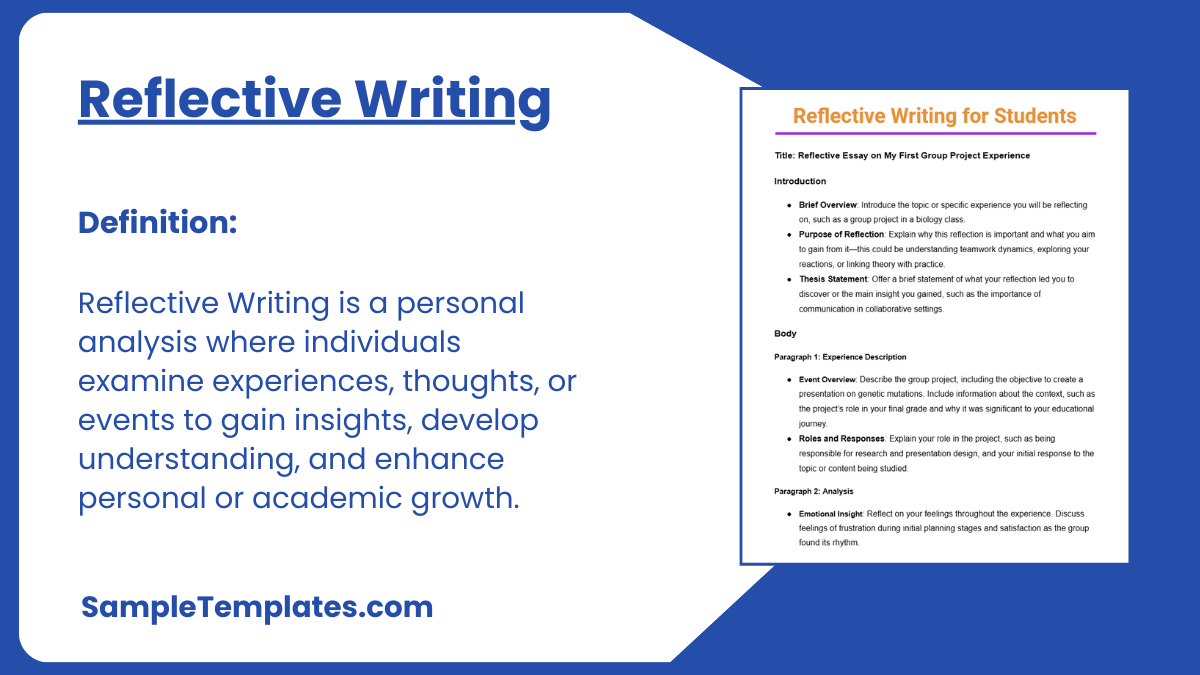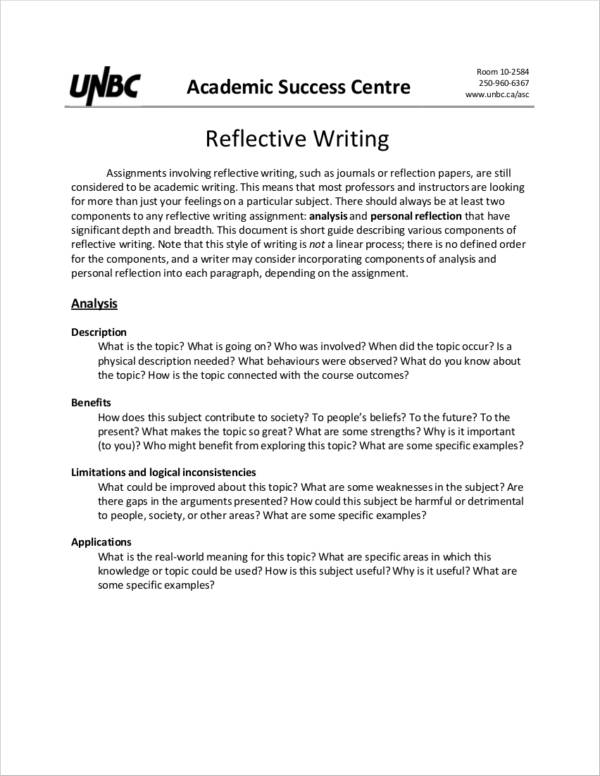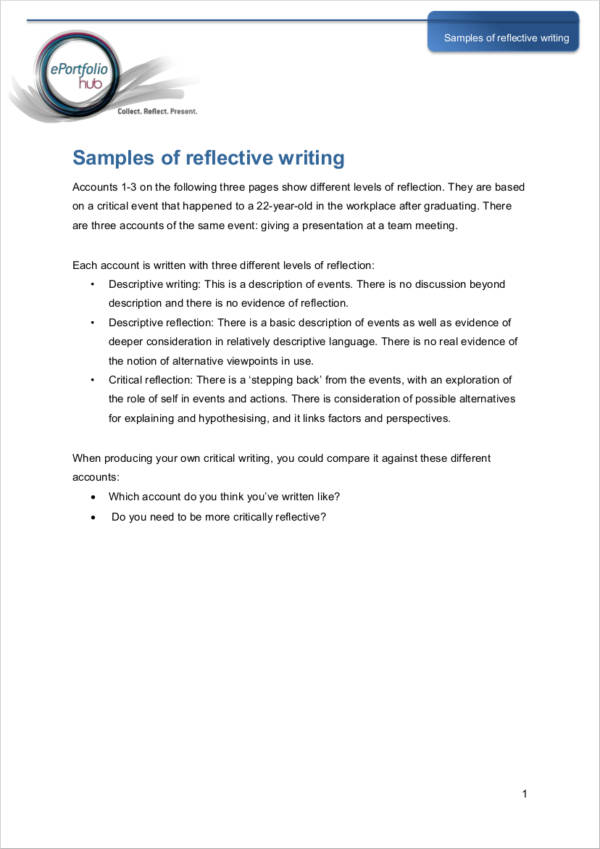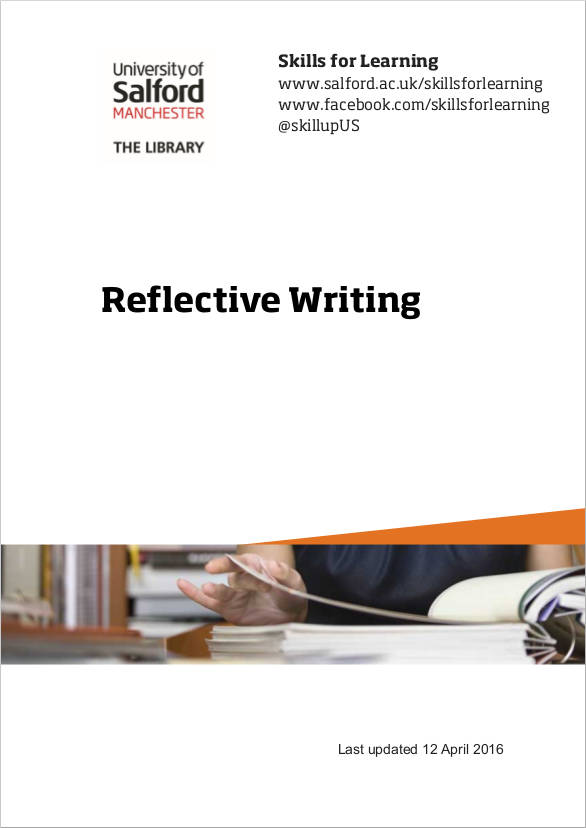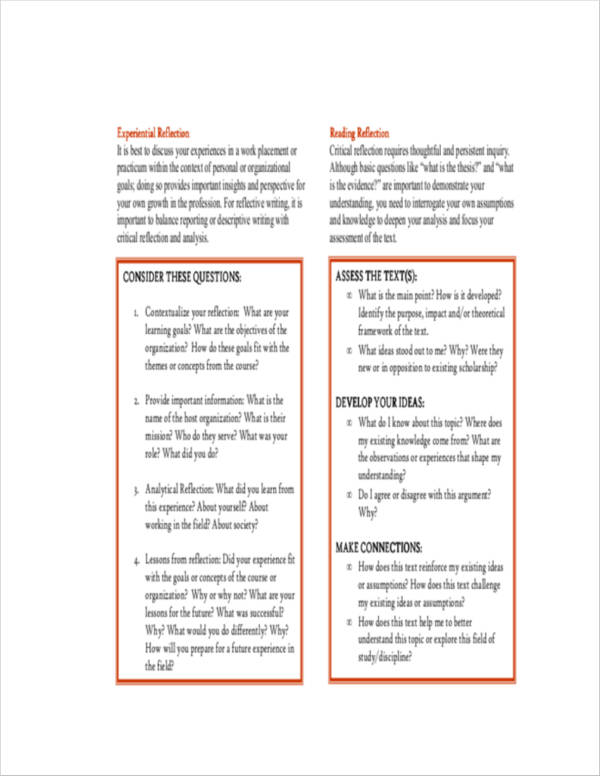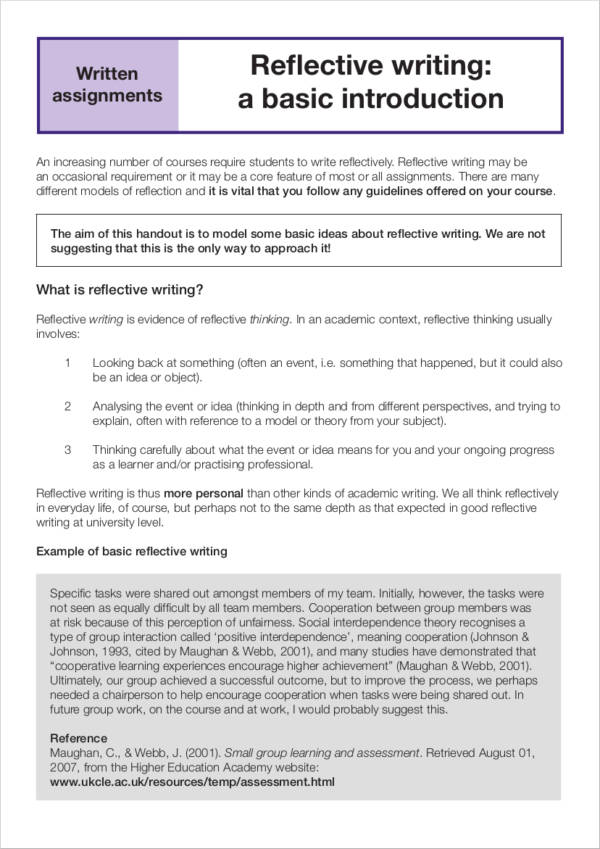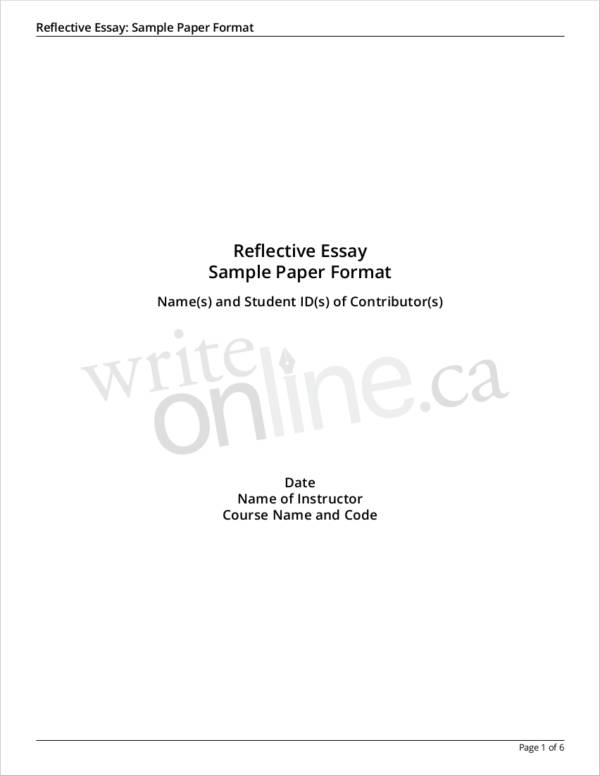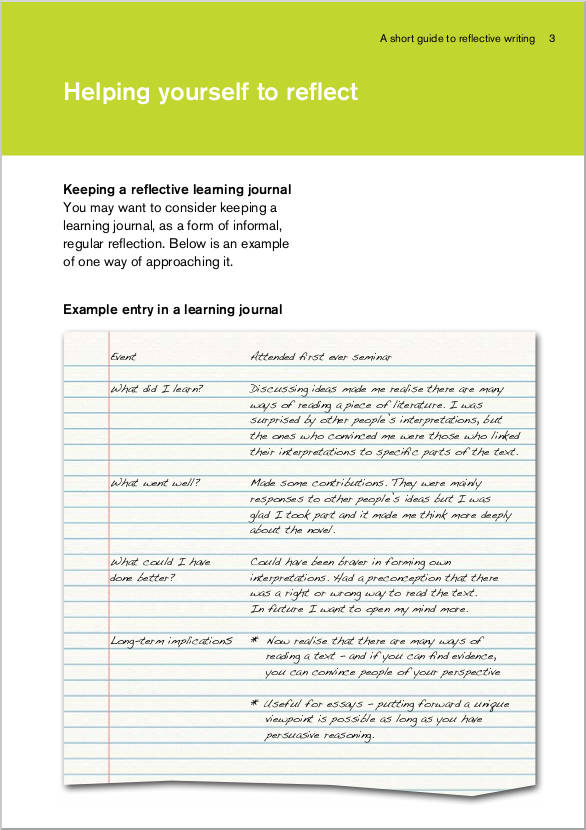You may be familiar with a lot of ways of writing, but have you ever encountered reflective writing? If you have not heard of it yet, we are here to give you a quick and helpful guide on how you can come up with a reflective essay in an easy manner. You may also like sample letter writings.
If you ever find yourself needing a couple of reflective essays, we’ve got you covered! We are also going to give you a couple of sample reflective essays that can help to get a head start when it comes to writing a reflective essay. The samples we have are of high quality to ensure that for whatever the reason is that you are writing your essay, it will end up being well written and being organized. Are you ready to find out more? Just make sure to keep reading this article. You may also see Free Writing Samples.
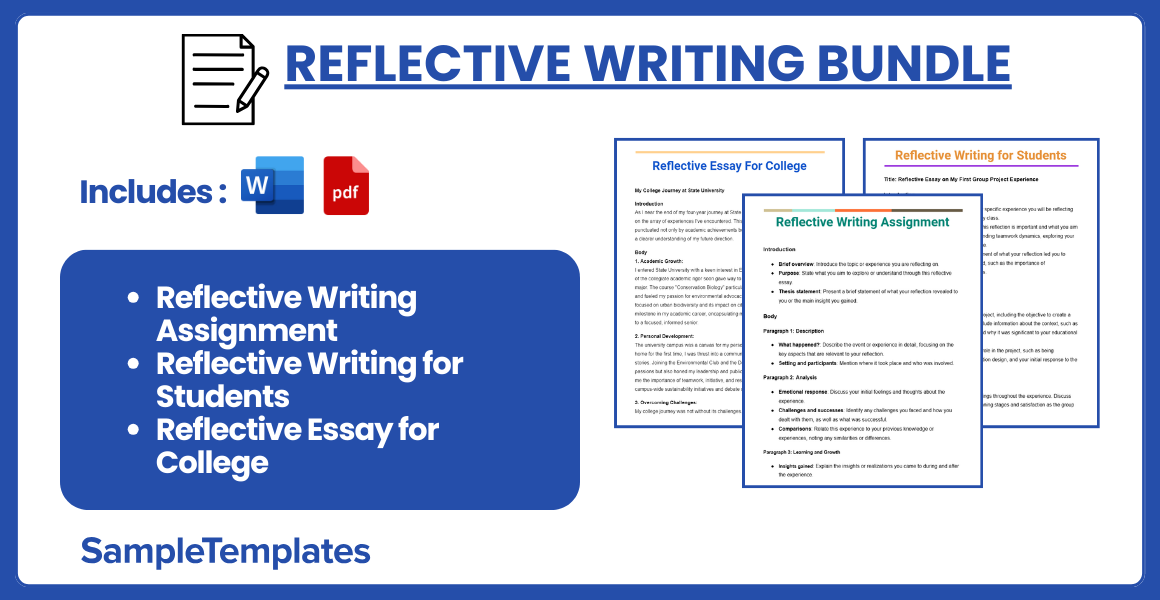
Download Reflective Writing Bundle
Reflective Writing Assignment
Introduction
- Brief overview: Introduce the topic or experience you are reflecting on.
- Purpose: State what you aim to explore or understand through this reflective essay.
- Thesis statement: Present a brief statement of what your reflection revealed to you or the main insight you gained.
Body
Paragraph 1: Description
- What happened?: Describe the event or experience in detail, focusing on the key aspects that are relevant to your reflection.
- Setting and participants: Mention where it took place and who was involved.
Paragraph 2: Analysis
- Emotional response: Discuss your initial feelings and thoughts about the experience.
- Challenges and successes: Identify any challenges you faced and how you dealt with them, as well as what was successful.
- Comparisons: Relate this experience to your previous knowledge or experiences, noting any similarities or differences.
Paragraph 3: Learning and Growth
- Insights gained: Explain the insights or realizations you came to during and after the experience.
- Skills developed: Discuss any skills or competencies you developed or improved upon.
- Theoretical connections: Link your experiences and insights to relevant theories or literature, if applicable.
Conclusion
- Reflection summary: Summarize your overall learning and the emotional journey of your experience.
- Future application: Discuss how the insights gained will affect your future actions, decisions, or your perspective on similar topics.
- Closing thoughts: Offer a final thought or question to leave the reader with something to ponder.
References (if any)
- Citing sources: List any sources you have referred to, adhering to the appropriate academic style (APA, MLA, Chicago, etc.).
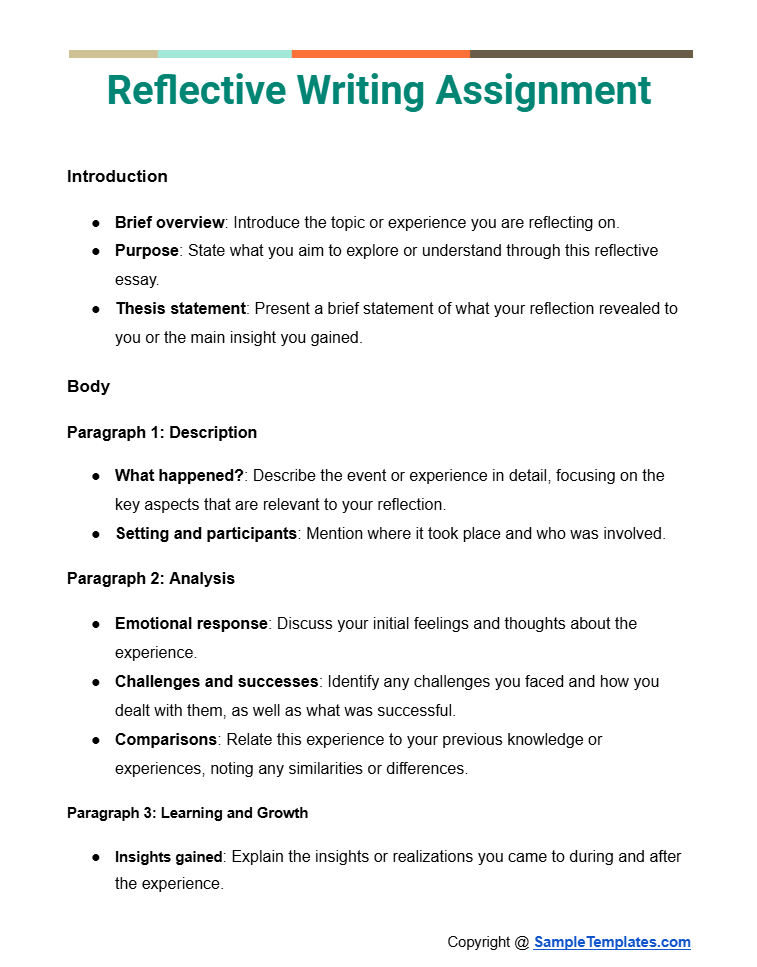
Reflective Writing for Students
Title: Reflective Essay on My First Group Project Experience
Introduction
- Brief Overview: Introduce the topic or specific experience you will be reflecting on, such as a group project in a biology class.
- Purpose of Reflection: Explain why this reflection is important and what you aim to gain from it—this could be understanding teamwork dynamics, exploring your reactions, or linking theory with practice.
- Thesis Statement: Offer a brief statement of what your reflection led you to discover or the main insight you gained, such as the importance of communication in collaborative settings.
Body
Paragraph 1: Experience Description
- Event Overview: Describe the group project, including the objective to create a presentation on genetic mutations. Include information about the context, such as the project’s role in your final grade and why it was significant to your educational journey.
- Roles and Responses: Explain your role in the project, such as being responsible for research and presentation design, and your initial response to the topic or content being studied.
Paragraph 2: Analysis
- Emotional Insight: Reflect on your feelings throughout the experience. Discuss feelings of frustration during initial planning stages and satisfaction as the group found its rhythm.
- Challenges and Responses: Identify challenges like coordinating schedules and differing opinions on presentation content. Reflect on how you responded by initiating a shared online calendar and advocating for democratic content decisions.
- Connections to Learning: Make connections between your experience and your coursework. Discuss how handling disagreements helped you understand deeper aspects of genetic mutations through collaborative learning.
Paragraph 3: Learning Outcomes
- Personal Growth: Discuss what you learned about yourself, such as discovering your ability to lead under pressure.
- Academic and Practical Insights: Detail the academic insights gained, such as a deeper understanding of genetic mutations, and discuss how you can apply these insights practically in your educational or personal life.
- Future Applications: Reflect on how this experience has prepared you for future challenges in academic and personal contexts, like being more effective in group settings and using structured problem-solving methods.
Conclusion
- Synthesis of Insights: Recap the key insights and learning points you’ve discussed, emphasizing how they will impact your future actions.
- Personal Development: Reflect on how this process has contributed to your development as a student and as a person.
- Closing Reflection: Offer a final reflective thought or question that encapsulates your journey through the reflective writing process, such as how future group projects might differ based on this experience.
Additional Elements
- References: If your reflection is based on specific academic content, cite any sources you have referenced using the appropriate academic style, like APA or MLA.
- Appendices or Visual Aids: Include any relevant materials that support your reflection, such as images, charts, or excerpts from journals.
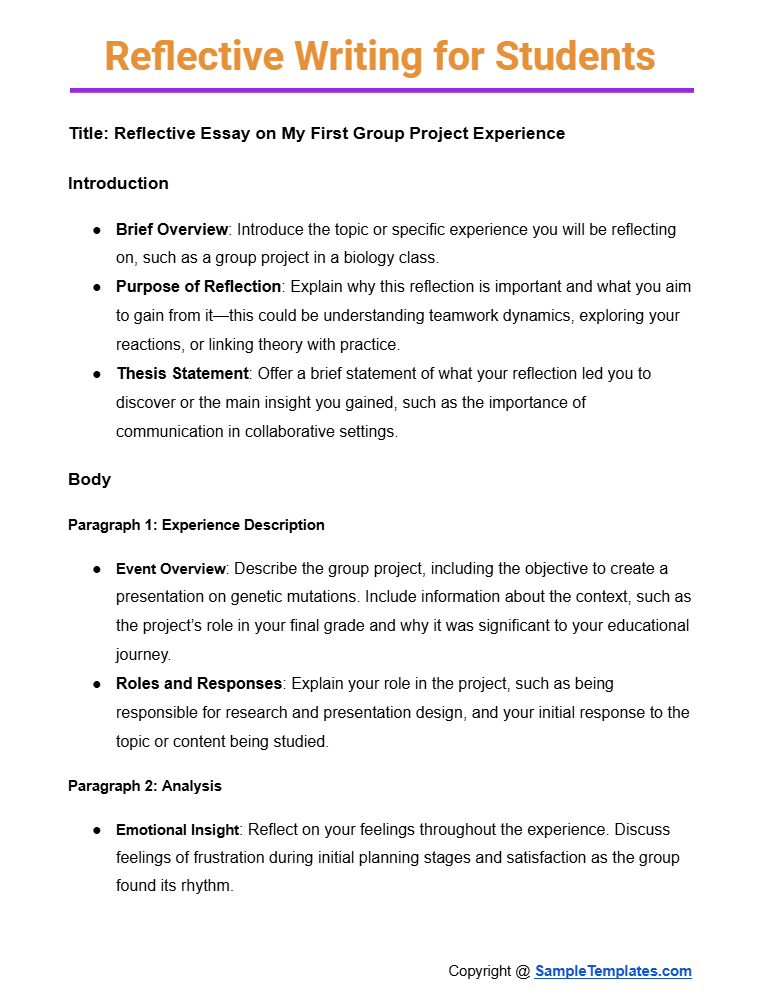
Reflective Essay for College
My College Journey at State University
Introduction
As I near the end of my four-year journey at State University, I am compelled to reflect on the array of experiences I’ve encountered. This chapter in my life has been punctuated not only by academic achievements but also significant personal growth and a clearer understanding of my future direction.
Body
1. Academic Growth:
I entered State University with a keen interest in Environmental Science. The initial awe of the collegiate academic rigor soon gave way to a profound engagement with my major. The course “Conservation Biology” particularly transformed my understanding and fueled my passion for environmental advocacy. Completing my senior thesis, which focused on urban biodiversity and its impact on city planning, marked a significant milestone in my academic career, encapsulating my transition from a curious freshman to a focused, informed senior.
2. Personal Development:
The university campus was a canvas for my personal development. Living away from home for the first time, I was thrust into a community with diverse perspectives and life stories. Joining the Environmental Club and the Debate Team, I not only pursued my passions but also honed my leadership and public speaking skills. These roles taught me the importance of teamwork, initiative, and resilience, especially when we organized campus-wide sustainability initiatives and debate competitions.
3. Overcoming Challenges:
My college journey was not without its challenges. Balancing a demanding academic schedule with club responsibilities and a part-time job was overwhelming at times. During my sophomore year, I faced academic probation due to underperformance, which was a wake-up call. With determination and the support of academic advisors and friends, I improved my time management and study habits, which were pivotal in reversing my academic decline.
4. Planning for the Future:
With graduation looming, I am excited and anxious about the future. My experiences at State University have equipped me with critical skills for the environmental sector. I am now gearing up to apply for a Master’s program in Sustainable Urban Development, aiming to leverage my undergraduate learning to effect real-world change.
Conclusion
Reflecting on my tenure at State University, it is clear that the tapestry of experiences has molded me into a more capable, thoughtful individual. The trials and triumphs of college life have prepared me for the complexities of the real world. I leave the university with not only a diploma but a treasure trove of memories, lessons, and friendships that will guide me through the journey ahead.
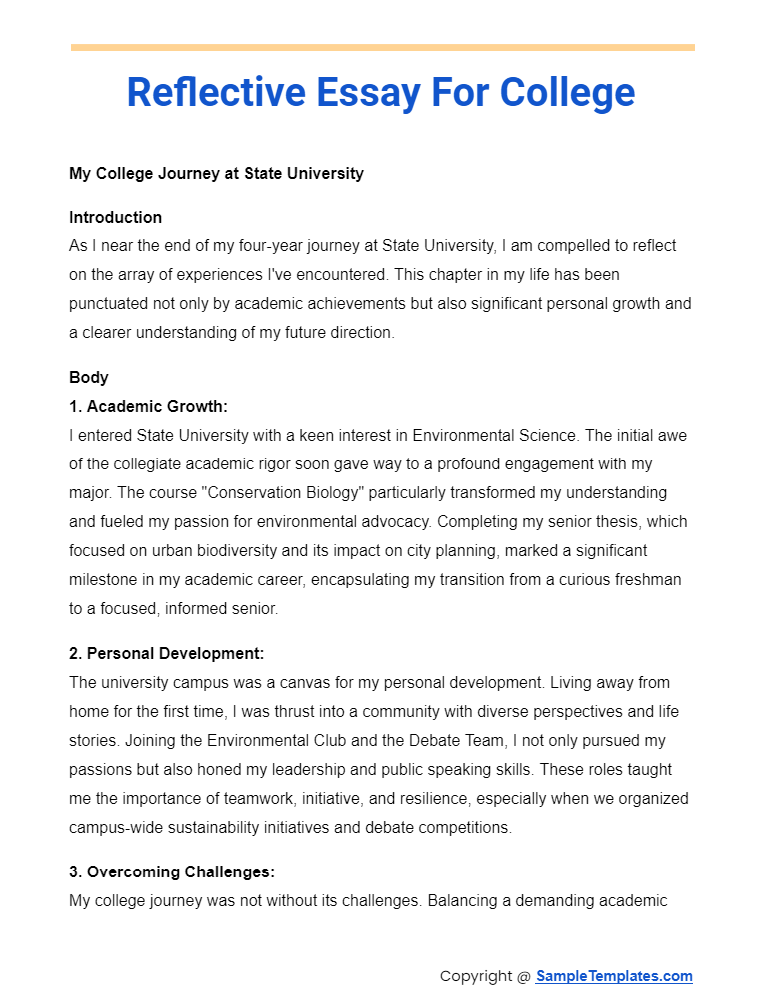
Browse More Templates On Reflective Writing
Sample of Reflective Writing
Sample Descriptive Reflection
How to Write a Reflective Essay?
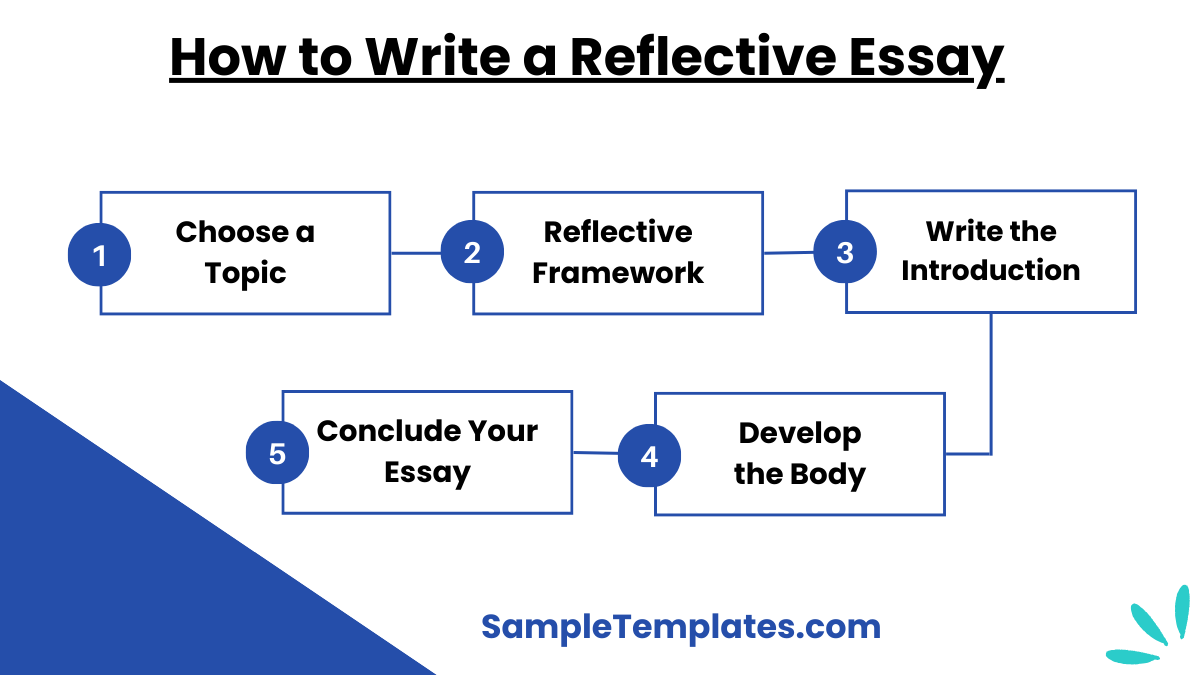
- Choose a Topic: Start by selecting an experience or event to reflect upon. This could be a personal memory, an academic assignment, or a professional challenge. Ensure the topic is meaningful to you and offers depth for reflection.
- Reflective Framework: Use a structured approach such as the Gibbs Reflective Cycle or Kolb’s Learning Cycle to organize your thoughts. These frameworks help structure your essay by breaking down the experience into stages like description, feelings, evaluation, analysis, conclusion, and action plan.
- Write the Introduction: Introduce your topic and provide a brief overview of the experience you will be discussing. Include a thesis statement that outlines the main focus or lesson learned from the experience.
- Develop the Body: Detail the experience and your personal reflections. Discuss what happened, how it affected you, what insights or lessons you gained, and how it contributed to your personal or professional development. Use specific examples to illustrate your points and connect your reflections to broader themes or theories if relevant.
- Conclude Your Essay: Summarize the main insights or changes in understanding that emerged from your reflection. Discuss any future implications or actions you plan to take based on the lessons learned. The conclusion should bring closure to your reflective journey and underscore the personal significance of the experience. You can also see more on Reflective Writing.
Reflective Writing Sample Guide
What is Reflective Writing?
Reflective writing is a type of writing wherein the writer writes an essay based on his/her own opinions. Basically, a reflective essay is a result of a person’s reflective thinking. More often than not, it will include
- The need to look back or reminisce an event, idea, or object;
- The need to analyze an event or idea; and
- The need to think about the value or what the subject of reflective writing means to you.
When it comes to reflective writing, it is basically a lot like rewinding past events and revisiting previous happenings in your life and thinking about how such events have affected and have made an impact in your life. You can also share what could have happened should things have been done differently and what came out of the event. With all of these being said, we can say that reflective writing is a more personal type of writing compared to other types of essay writing. You may also see the White Paper Templates.
To effectively express your ideas in your reflective essay, there are a couple of things that you need to put into consideration. Such things can be as follows: You may also see the Biography Writing Samples
- The reason why you are writing your essay.
- Will others be reading what you are sharing?
- How do you feel about writing the essay?
- How are you feeling while you are writing expressing your thoughts?
- How capable are you to write an essay in a reflective manner?
Reflecting on something is a mental process, which means that you need to take your time when you start contemplating or when you start considering what you want to share. The thoughts and opinions that come your way while you are reflecting are what we call as reflection. You may also see Business Writing Samples.
The Process of Reflecting
There are three areas when it comes to reflecting:
- Technical – The technical aspect of reflecting refers to which processes have worked and which ones did not work. It can also refer to the methodologies that you have done in order to solve problems and what theories have been applied. You may also see Memo Writing Samples.
- Group – This refers to the group dynamics and how everybody has done their job. Did everyone perform the task assigned to them? Could anyone have done something better? What group techniques were used and why did other techniques not work?
- Individual – This refers to what you have learned, how did you learn it, how did you feel, and what you could have done better to make the results better. You may also like Business Report Writing Samples
Reflective Writing Structure
Reflective article writing, since it is a more personal way of expressing ideas and opinions, can be written in a way that is “free” and unstructured. However, unstructured essays written in a reflective manner are applicable only if you are writing the essay for yourself such as in your journal or diary. For essays that you would need to submit such as ones for a class requirement, there is a simple structure that you would need to follow to make your reflective essay look more professional and more organized. To make your reflective essay look like it has been carefully structured, check out our tips.
- Description. The description of your essay would talk about what has happened and what is being examined. This part of your essay does not need to belong. Keeping it brief and straight to the point is highly preferred as you will be able to immediately relay the message that you want the reader to know.
- Interpretation. The interpretation part of your essay will be the main meat of your write-up. This is where you will let your readers know the relevance of the subject of your essay, how you will be able to explain our essay (i.e., evidence, theories, examples, etc.), and how similar it is to other subjects. You may also see the Biography Writing Samples
- Results. This is where you will discuss the outcome of the situation. You will also discuss in this section what you have learned from the outcome and what is the implication of the results for your future. You can also discuss or give suggestions in this section what you could have done better or what could have been changed to achieve a better result. You may also see the Article Writing Samples
What has been discussed is just the basic structure that would be required should you want to write in a more organized manner. However, you may be required by your professor to have some add-ons that can help add more value to your essay. We would like to share with you a couple of key points that you need to remember in order that will do just that. You may also see Memo Writing Samples
- Reflective writing is not just about describing. It is more of an adventure as you would need to explore and explain the subject of your write-up.
- You need to be genuine when it comes to writing your reflective essay. This means that aside from revealing strengths, you would also need to reveal a couple of weaknesses. This way, you will be able to reflect on the strengths and weaknesses together. Just make sure that you show a good understanding of what has happened.
- Discuss the most important parts. This will make your essay more straightforward and it will also help you be more focused on the subject at hand.
- Do not forget to also discuss anything that may be helpful for future reference. This is because reflecting for the future is just as good as reflecting on the past. You may also see the Printable Writing Paper Templates.
Want more tips on how you can make your essay be more organized? You may want to check out Essay Outline Samples.
Reflective Writing Sample in PDF
Reflective Writing Format
Reflective Essay Sample Paper Format
Tips For Writing a Reflective Essay
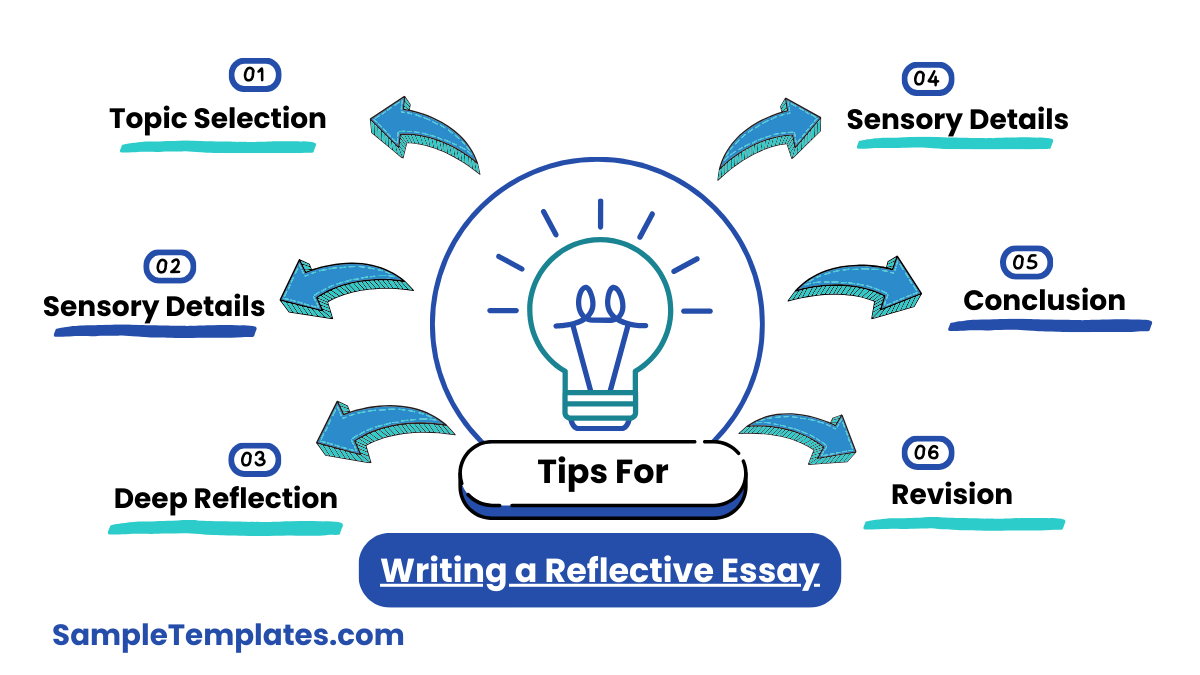
- Choose a Meaningful Topic:
- Select a topic that has personal significance or that has had a profound impact on you. This could be an event, a person, a conversation, or even a period in your life.
- Use the First-Person Narrative:
- Since reflective essays are personal, write in the first person to describe your experiences and feelings. This approach makes your writing more authentic and engaging. You can also see more on School Essay.
- Create a Strong Introduction:
- Begin with an attention-grabbing introduction that hints at the reflective theme of your essay. You might start with a question, a quote, or a vivid description of the scene or moment you’re reflecting on.
- Detail Your Experience:
- Clearly describe the experience or event. Provide enough background information so that readers understand the context and why this reflection is significant to you.
- Reflect, Don’t Just Recap:
- Go beyond merely describing the event. Analyze and interpret what happened, how it affected you, what you learned, and why it matters. This is the core of your reflective essay. You can also see more on Student Essay.
- Incorporate Feelings and Sensory Details:
- Express how you felt during the experience and what tangible sights, sounds, or smells you associate with the event. These details can help the reader empathize with your personal journey.
- Draw a Conclusion:
- Summarize your learning or the new understanding you gained through this experience. Reflect on how this insight changes your perspective on the issue or affects your future behavior.
- Proofread and Revise:
- After writing your first draft, take some time to revise and refine your essay. Look for clarity in your writing, check the flow of your narrative, and ensure your reflective insights are clearly expressed. Proofreading for grammar and spelling errors is also crucial. You can also see more on Academic Essay.
Learning Journal Reflective Writing
We hope that you learned a lot from reading our article about reflective writing. Do not hesitate to click on the DOWNLOAD button that you will find next to the samples that we have uploaded in order for you to get a hold of the samples. You may also see the Script Writing Samples.
If you need tips and guidelines on how you can write essays in a more technical manner, you may want to check out Technical Writing Samples and Templates.
How to start a critical reflective essay?
Begin with a compelling hook: pose a thought-provoking question, cite a relevant quote, or describe a powerful scene to set the reflective tone.
Is a reflective essay first person?
Yes, reflective essays are typically written in the first person to offer a personal perspective and connect deeply with the reader.
What to avoid in reflective writing?
Avoid generic descriptions and superficial reflections. Steer clear of clichés, overly casual language, and unfocused rambling.
Does a reflective essay have a title?
Yes, a reflective essay should have a descriptive and engaging title that hints at the essay’s focus and tone.
Can you refer to yourself in a reflective essay?
Yes, you can and should refer to yourself in a reflective essay, as it is personal and introspective, centering around your experiences and insights.
Related Posts
Weekly Schedule Samples & Templates
Contractual Agreement Samples & Templates
FREE 9+ Amazing Sample Church Bulletin Templates in PSD | PDF
Sample Business Card Templates
Sample Cashier Job Descriptions
Questionnaire Samples
FREE 10+ Sample HR Resource Templates in PDF
FREE 10+ HR Consulting Business Plan Samples in MS Word | Google Docs | Pages | PDF
FREE 49+ Sample Job Descriptions in PDF | MS Word
FREE 16+ Nonprofit Budget Samples in PDF | MS Word | Excel | Google Docs | Google Sheets | Numbers | Pages
FREE 13+ Academic Calendar Templates in Google Docs | MS Word | Pages | PDF
FREE 10+ How to Create an Executive Summary Samples in Google Docs | MS Word | Pages | PDF
FREE 23+ Sample Event Calendar Templates in PDF | MS Word | Google Docs | Apple Pages
Company Profile Samples
FREE 10+ Leadership Report Samples [ Development, Training, Camp ]
